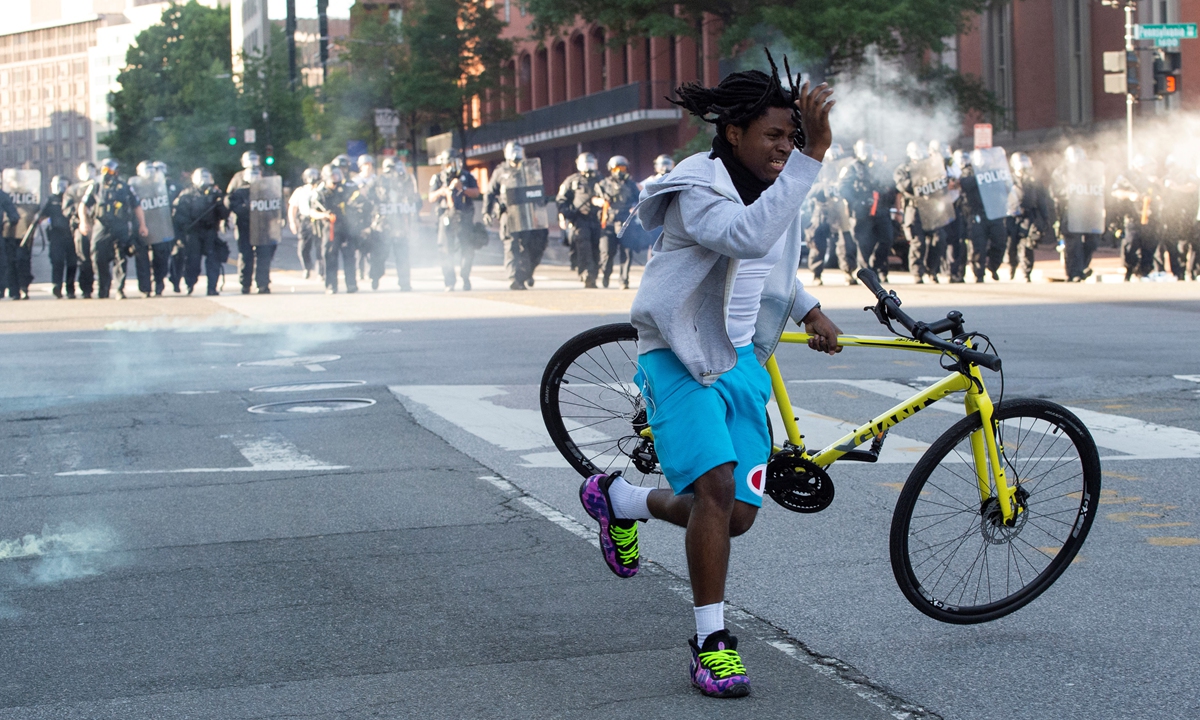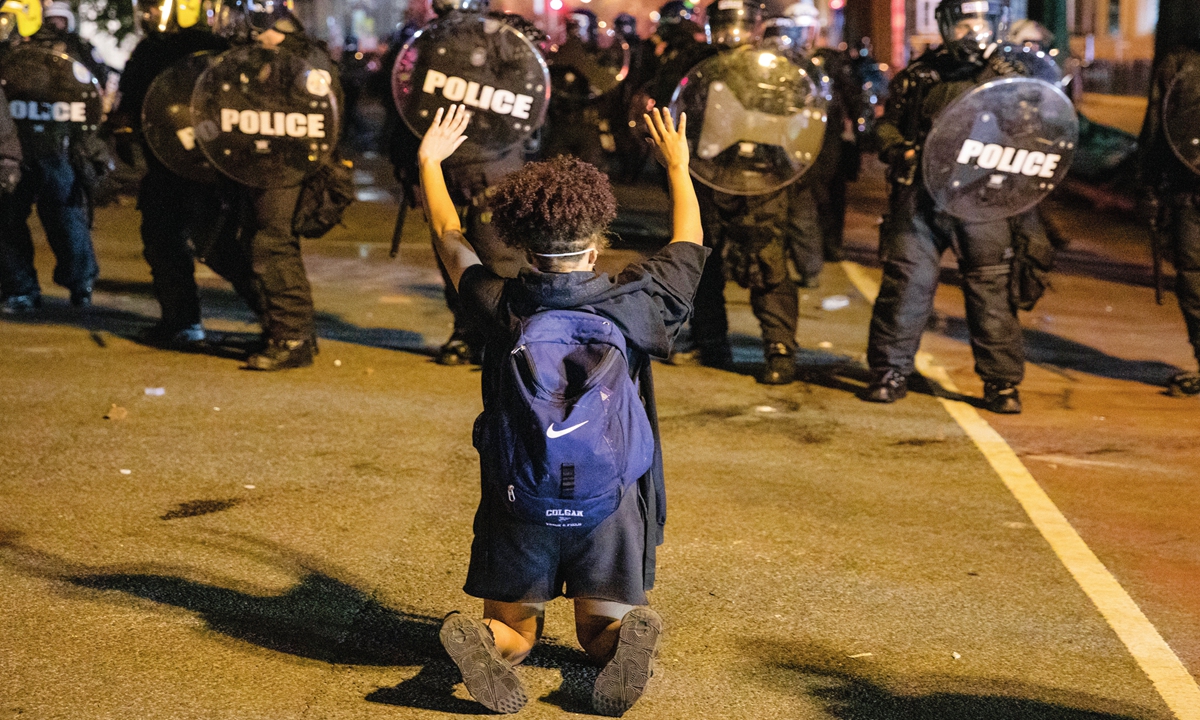Growing social division, far-left and far-right confrontation underlying cause for unrest: experts
By GT staff reporters Source:Global Times Published: 2020/6/2 19:13:40

A protester grabs his bike as police use tear gas and rubber bullets to disperse the crowd near the White House on Monday. Photos: AFP
Trump tweeted Sunday that the US "will be designating ANTIFA as a Terrorist Organization." The move brought Antifa, a group of far-left anti-fascism activists, into global spotlight. But it also drew criticism for Trump for shifting focus on the country's long existed systematic discrimination against black people and white supremacy that has gained momentum in recent years.
"Antifa isn't the problem. Trump's bluster is a distraction from police violence," read an article in the Washington Post on Monday.
"Trump's reckless accusations lack evidence, like many of his claims. But they also intentionally misrepresent the anti-fascist movement in the interest of delegitimizing militant protest and deflecting attention away from the white supremacy and police brutality that the protests oppose," read the Washington Post article.
While Trump and some Republican politicians accused Antifa of being responsible for the violent protests, some other politicians contradicted this claim, pointing to another direction - far-right white supremacists.
Minnesota Governor Tim Walz, a Democrat, suggested that he thought far-right white supremacists and perhaps organized drug cartels should be responsible for it. The governor told reporters that he had no doubt the protests first began with frustration over inequality, inequities and racism that persisted in the state.
Diao Daming, a China-US relationship expert at Renmin University of China in Beijing, told the Global Times that some clues showed that Antifa participated and fueled the protests but they are not the real deep-seated causes for the protests.
The fundamental reason for the protests is that domestic conflicts in the US are intensifying, Diao said. He pointed out that since Trump assumed office in 2017, his permissive attitude in racism further aggravated social conflicts.
According to US media reports, movements of Antifa as well as far-right white supremacists are both becoming more active over the past three years.

A demonstrator kneels and raises her hands facing a police line in front of the White House while protesting the death of George Floyd at the hands of Minneapolis Police, in Washington, D.C. on Sunday. Police fired tear gas outside the White House as major US cities were put under curfew to suppress rioting. Photo: AFP
Why Antifa?Antifa is a loosely organized movement with members sharing the philosophy of social revolutionary self-defense to fight the far-right and it could trace back to the radicals who fought against Benito Mussolini and Adolf Hitler almost a century ago, read media reports.
The group believes militant self-defense is necessary in fighting against the far-right, and their methods can be violent and destructive.
"The argument is that militant anti-fascism is inherently self-defense because of the historically documented violence that fascists pose, especially to marginalized people," said Mark Bray, a history lecturer at Rutgers University and author of "Antifa: The Anti-Fascist Handbook" in a New York Times report.
For many American people, they first got to know Antifa in 2017 during their confrontation against white supremacists in Charlottesville.
The violence that erupted in Charlottesville soon made international headlines that year when hundreds of white supremacists and their supporters protesting the removal of a Confederate statue met with counter-protesters, the "Unite the Right" rally. During the confrontation, a car drove into the crowd of counter-protesters, leading to one death and more than a dozen injured. The violent protest later led to Virginia's governor to declare a state of emergency.
Trump was then criticized for his initial ambiguous attitude and reluctance to criticize white supremacists.
Antifa is a far-left loose association of activists whose belief is anti-fascism, anti-xenophobia, anti-sexism and anti-LGBT bigotry, Li Haidong, an expert from China Foreign Affairs University in Beijing told the Global Times.
But meanwhile, they are anarchists and are unsatisfied with the government and affected social order in the US. "As of Trump, a representative of the far-right, he seeks to use his public power to knock down the left-wing and to achieve his goal of white supremacy," Li said.
Deep confrontation
While Trump said he would designate the organization as a terrorist group, it is still hard for him to achieve his goal as the US does not have a domestic terrorism law empowering him to do so, Diao said.
Currently, US law only allows designating foreign organizations as terrorist groups.
Li said one of the reasons that Trump called Antifa a terrorist group is because it holds totally opposite ideologies with Trump. "His administration might take action to prohibit Antifa. But if [Democrat presidential hopeful] Joe Biden won the election, Trump's action on Antifa might be halted."
He noted that on the other hand, Trump himself, being extremist in the US politics, could not stand for the majority, But Trump's remarks and behavior are splitting the current US politics and society, which could lead to deep confrontation.
"Trump is ill-mannered. He only creates splits, hatred to appeal certain group of voters. But in the end, it will hurt the US society," Li said. "He has chosen to hurt the whole society to help him face the disadvantages in the upcoming election."
If the current situation continues to deteriorate, the division of the society in the US will further worsen, Li said, noting that racism will last longer than before.
While the violent protests continue to swamp more cities, Diao expressed pessimism they will have limited effect on transforming the discriminatory US society.
Meanwhile, the partisan division in the US politics has been more closely linked with the tensions of race since 1990s. The increasingly divided US political culture leads to intensifying racial tensions. And aggravating racial tensions further fuels political division, Diao told the Global Times.
Newspaper headline: Split by US extremes
Posted in: IN-DEPTH